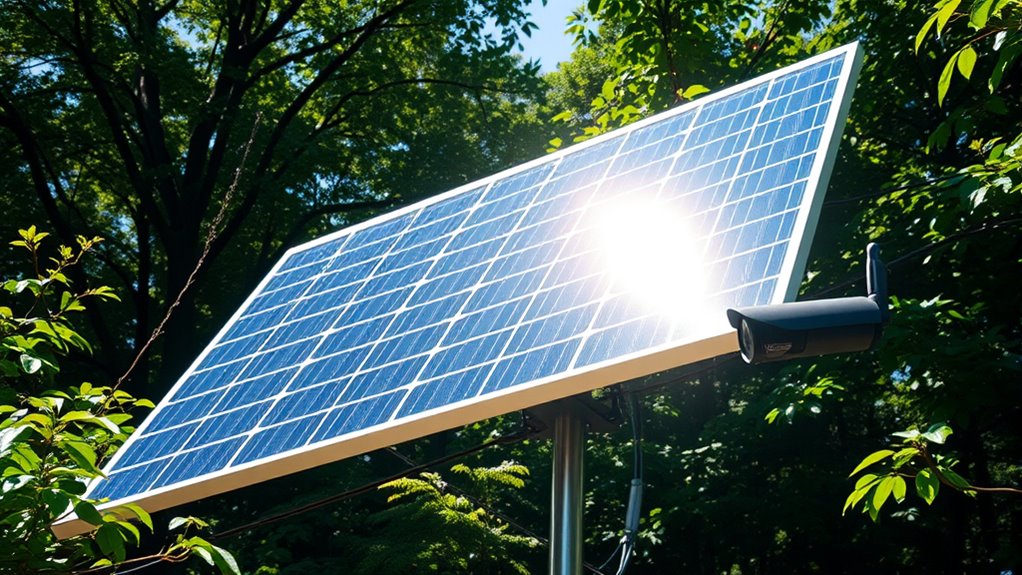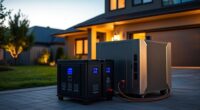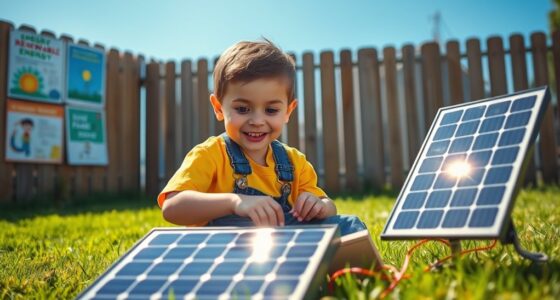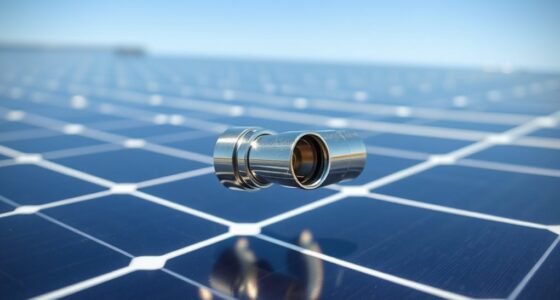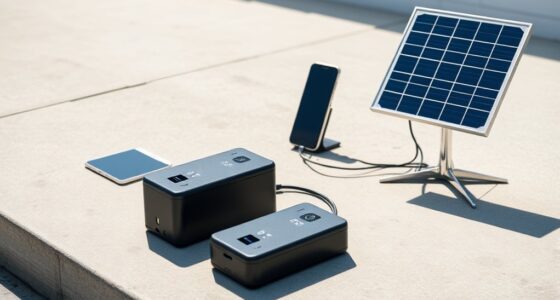Installing a solar panel for your security cameras guarantees continuous surveillance without relying on power outlets or wiring. It offers flexible placement, supports wireless connectivity, and keeps your cameras running during cloudy days or at night thanks to built-in batteries. This eco-friendly solution reduces costs and maintenance, especially in remote areas. With solar power, your security system stays active and resilient, no matter the weather or grid outages. Discover how to optimize your setup for full off-grid security.
Key Takeaways
- Solar panels enable continuous off-grid power for security cameras, ensuring uninterrupted surveillance without relying on electrical outlets.
- They support wireless connectivity, allowing flexible camera placement in hard-to-reach or remote locations.
- Battery backup systems store excess energy, maintaining camera operation during cloudy days and at night.
- Solar-powered cameras reduce installation costs and maintenance by eliminating wiring and electrical expenses.
- Smart, wireless features enable remote monitoring and easy repositioning, enhancing security resilience off-grid.
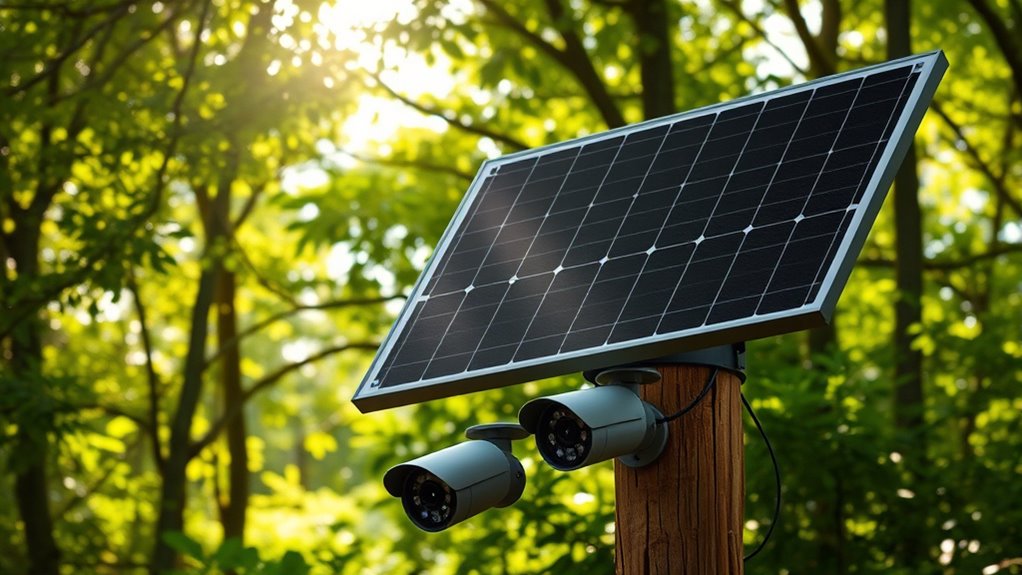
Are you tired of running wires or worrying about power outages affecting your security cameras? If so, a solar panel for security cameras might be just what you need to keep your surveillance system reliable and off-grid. With solar power, you can enjoy continuous security monitoring without the hassle of cable management or dependence on traditional electrical outlets. Many modern security cameras now support wireless connectivity, making installation easier and more flexible. You won’t have to drill holes or run long cords through your property, which keeps your setup tidy and less invasive. Plus, a solar panel paired with a camera that features a battery backup ensures your system remains operational even during cloudy days or at night. This combination gives you peace of mind, knowing your security system can withstand the elements and power fluctuations.
When you choose a solar panel for your security cameras, you’re investing in sustainability and convenience. These panels harness sunlight to generate electricity, which is then stored in a built-in or external battery. This stored energy powers your camera, allowing it to operate continuously without the need for electrical wiring. Because many cameras now support wireless connectivity, you can position them in places that are hard to reach with wires—like high on a pole or tucked into hard-to-access corners. This flexibility makes it easier to cover large or tricky areas around your property. The battery backup plays a critical role here; even during long stretches of overcast weather or at night when sunlight isn’t available, the stored energy keeps your cameras running smoothly. It’s like having a reserve tank of power that kicks in automatically, so there’s no interruption in your surveillance.
Furthermore, solar panels reduce ongoing costs, since you won’t be paying for electricity and can avoid the expenses associated with running wires or installing power outlets. Their low maintenance makes them an attractive option for remote locations or properties where running power is impractical. The combination of wireless connectivity and battery backup means your cameras can be more resilient and adaptable. You can reposition or upgrade your system without worrying about wiring constraints or power loss. Additionally, many solar-powered security cameras are equipped with smart features, allowing you to monitor feeds remotely through your smartphone or computer, further enhancing your security setup. This setup empowers you to maintain oversight of your property without interruption, regardless of weather or grid issues.
Frequently Asked Questions
How Do Solar Panels Perform During Winter or Cloudy Days?
During winter or cloudy days, your solar panels may experience reduced solar efficiency, but they still generate power thanks to their weather resilience. Snow and clouds may temporarily lower output, yet panels can still produce energy because they work with diffused sunlight. To guarantee consistent performance, keep panels clean and unobstructed, and consider higher-capacity panels. This way, your off-grid security system stays active even in less sunny conditions.
What Is the Maintenance Required for Solar-Powered Security Cameras?
Think of your solar-powered security cameras as your dedicated guards—they need some TLC to stay sharp. You should regularly check the batteries for replacement and keep the solar panels clean, removing dust and debris that block sunlight. Follow simple cleaning procedures, like gentle wiping, to maintain efficiency. With these small efforts, your cameras will continue to watch over you, rain or shine, ensuring your security stays strong.
Can Solar Panels Power Multiple Cameras Simultaneously?
Yes, solar panels can power multiple cameras simultaneously if you consider your battery capacity and wiring configurations. You’ll need a panel large enough to generate sufficient power for all cameras and a battery system to store energy for cloudy days. Proper wiring configurations ensure efficient power distribution. By planning your setup carefully, you can keep all your security cameras operational off-grid without interruption.
How Do I Prevent Theft or Vandalism of Solar Panels?
Did you know that over 30% of solar panel thefts happen in rural areas? To prevent vandalism or panel theft, you should install cameras and motion sensors around your panels. Use sturdy locks and secure the panels to a solid structure. You can also fence off the area or add signage warning of security measures. These steps make it harder for thieves and vandals to target your solar panels.
What Is the Lifespan of a Typical Solar Panel for Security Cameras?
You should know that the lifespan of a typical solar panel for security cameras depends on its durability and maintenance. Generally, solar panels last about 25-30 years, with high durability resisting weather and wear. The battery life expectancy varies, often needing replacement every 3-7 years. Regular cleaning and proper installation will help maximize both the panel’s longevity and battery performance, ensuring your surveillance system stays reliable off-grid.
Conclusion
By choosing a solar panel for your security cameras, you’re ensuring your surveillance stays active even off-grid. It’s a smart way to keep your property safe without relying on the power grid. Remember, “A stitch in time saves nine”—investing in solar now prevents future headaches. With reliable solar power, you can rest easy knowing your cameras won’t miss a thing, no matter where your property is.
